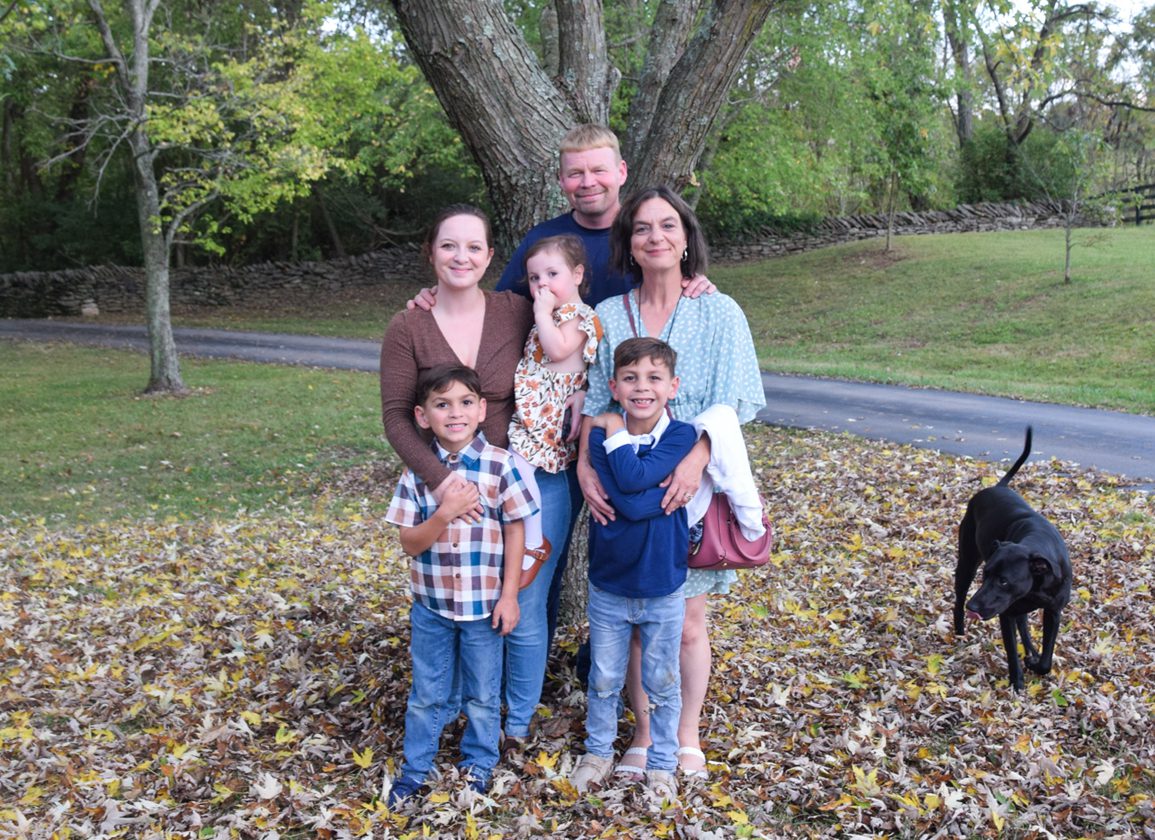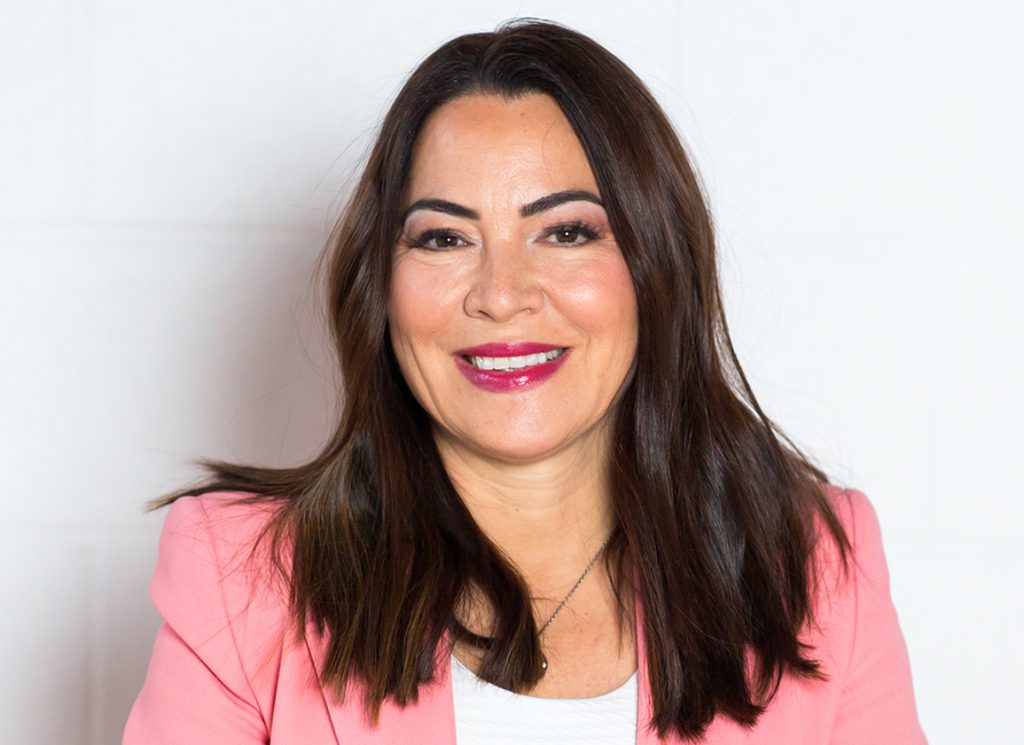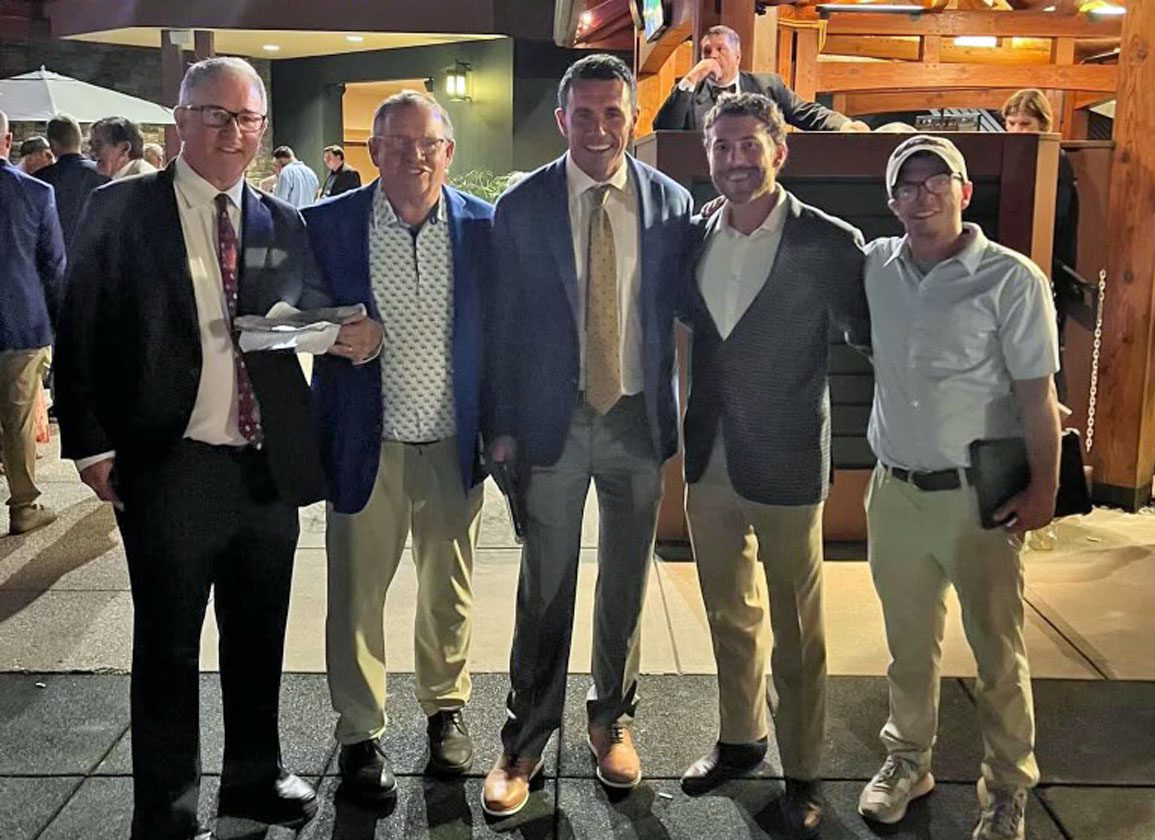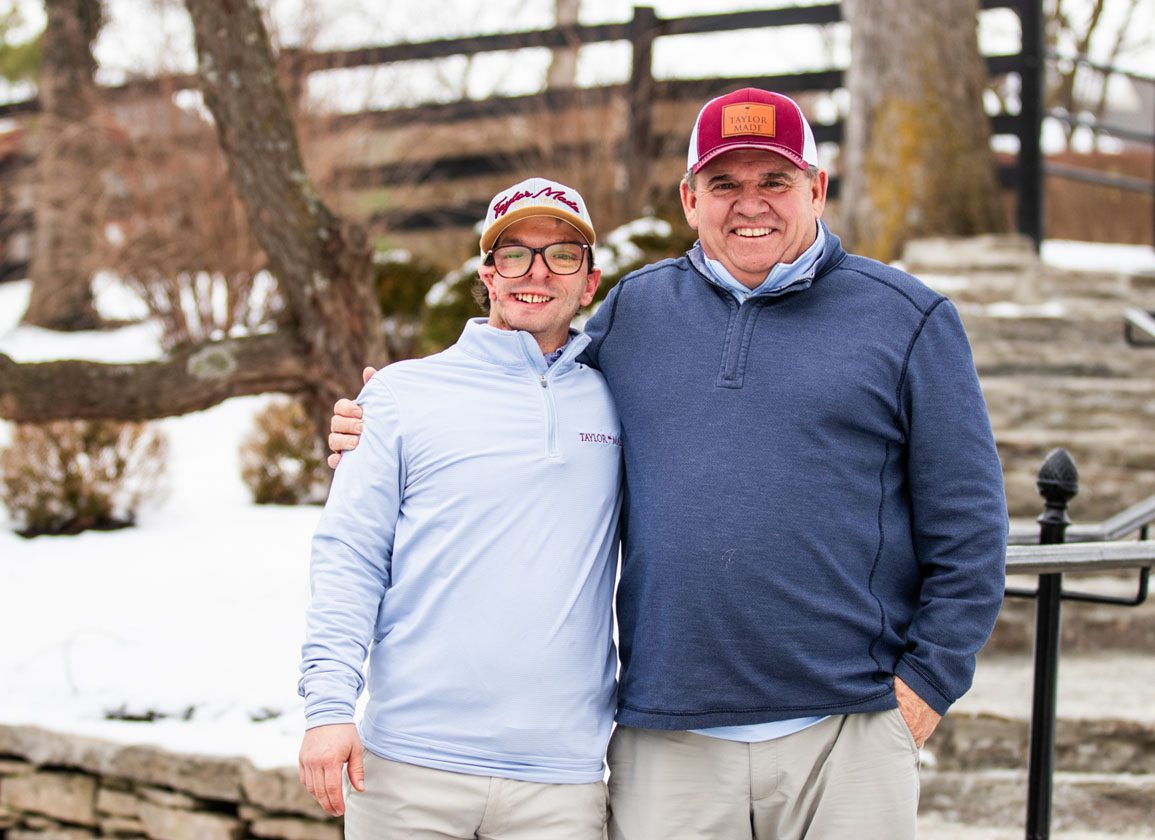Stable Recovery is a rehabilitation program in Lexington, Kentucky that provides a safe living environment and a peer-driven, therapeutic community for men in the early stages of recovery from drug and alcohol addiction. Along with going to 12-step meetings and support groups, residents attend the School of Horsemanship at Taylor Made Farm to learn a new vocation in the Thoroughbred industry. The School of Horsemanship is a project that was created by Taylor Made two years ago and has since seen over 100 men go through the program. Many of those graduates have gone on to pursue a career in an equine-related field. Spy Coast Farm, Brook Ledge, Hallway Feeds, Will Walden Racing, Rood & Riddle, WinStar Farm and Godolphin have recently partnered with Stable Recovery as the program looks to expand its reach throughout Lexington.
In this month's installment of TDN's series, 'The Road Back,' we introduce you to graduate William Jackson, now the house manager for Stable Recovery.
When crossing the threshold into Stable Recovery's house on Hummingbird Lane in Lexington, a true feeling of 'being home' washes over you. The sound of conversation and laughter fills the air as staff and residents make their way through the house while an assortment of dogs wag their way into the mix. And there in the front office on the right, seated at the desk across from me, is William Jackson.
The 46-year-old man with the kind eye and constant smile shares his life story with a calm that speaks to his character, spoken with a reverent tone of voice that reflects where he's been and how far he's come in his lifetime.
As he talks, the realization of how poignant this introduction and this conversation is settles in the room. Because less than two years ago, after decades of witnessing death and living on the brink of it, Jackson's heart stopped after an overdose.
“In September of 2022, I lost the house, the nice truck I had, we had all of the utilities turned off, and I was damn near about to go to jail. Then, I ended up getting hit by that car and later, overdosing in the room in that trailer,” recalled Jackson.
He had hit rock bottom. And it was the result of a life that revolved around one constant: drug use.
Born in Springfield, Mo., Jackson spent his early years primarily in the company of his mom, since his stepdad had been sent to prison early on and his five older siblings were much further ahead in their lives, all off on their own. By the time he was in fifth grade, they had relocated to Corbin, Ky., to live near the rest of his extended family.
“Most of my family, all my uncles and aunts and everyone, used a lot of drugs and drank. All the men drank beer all the time and most of my aunts were taking pills and smoked marijuana. I remember my cousins were doing it, too, they were a little older than me. And one of my cousins even grew some pot with his father. That was what they did,” said Jackson. “By the time I was 11, I was taking pills and smoking marijuana and drinking on the weekends. I started out just doing a little bit of everything.”
Growing up, the tragedy that Jackson experienced only perpetuated his dependence on using drugs as an escape.
“When I was 12, my sister committed suicide. That was pretty traumatic. And then, it was the next year I guess, I remember walking in the house and finding my grandmother dead. I was the one who found her.”
The loss of a close friend in high school, and later the loss of his girlfriend, only darkened his outlook on life.
“I had lots of little things that kept me angry, confused, and mad at the world. But I always felt like doing drugs was wrong. It was bad and I wanted to do the right thing. I always did good in school and I wanted to please people, but all this stuff kept always pushing me towards all of that other stuff,” said Jackson.
By the time he was 27, he'd already married and divorced his first wife, who sadly overdosed and passed away a year after their marriage ended. From there, Jackson went back home to live with his mom and eventually picked up drinking.
“I was an alcoholic for about 13 years. Pretty heavy. I could drink at least 3/5 of a bottle of hundred-proof a day by myself. That all led to me being diagnosed with cirrhosis of the liver. They gave me a year to live,” said Jackson. “It scared me, so I decided to quit drinking. By this time, I had already met my second wife, I was married again, and she went with me to Alcoholics Anonymous for a while. But I only went for about three months.”
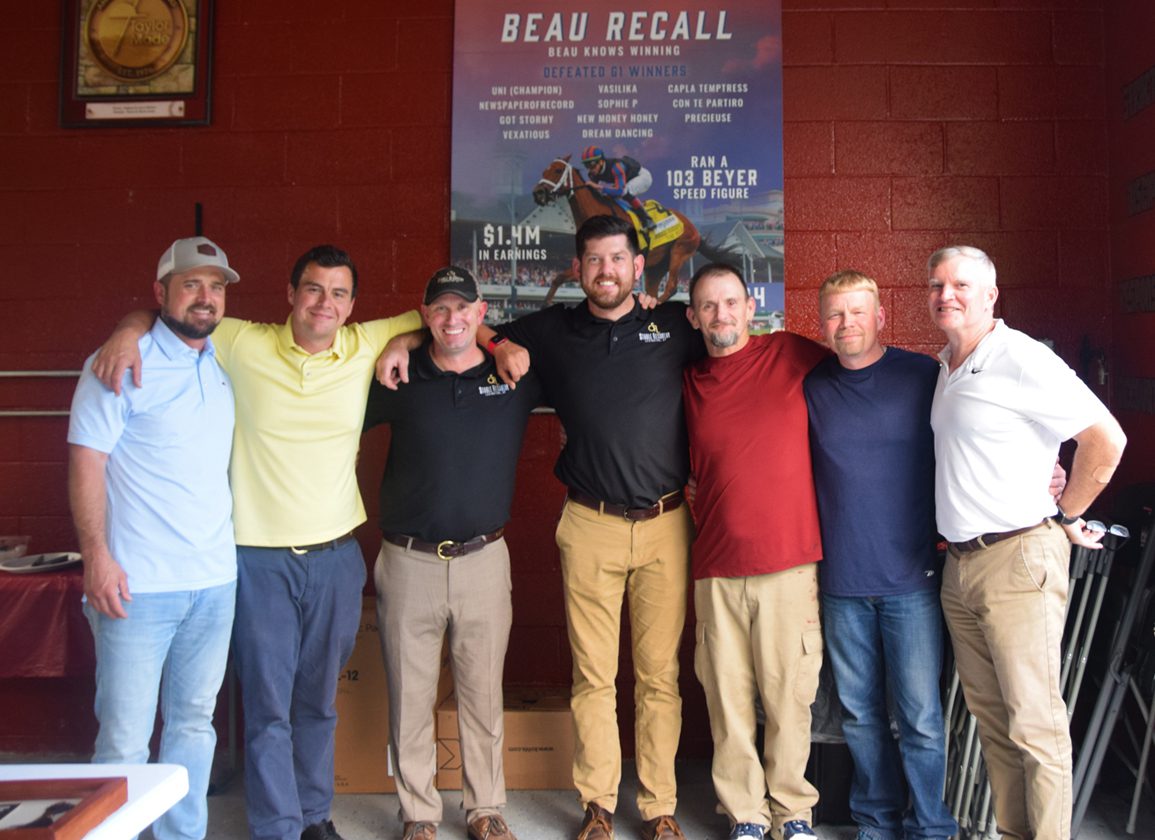
William Jackson becomes a Legacy of Stable Recovery. Pictured: Tyler Harris, Josh Franks, Christian Countzler, Ashton Becker, Carrol McCromick, William Jackson, and Dan Pride | Stable Recovery
Though he'd saved his liver, Jackson continued to pursue other avenues in his drug use, turning to buying and using Suboxone before eventually caving to the enticement of heroin by the time he was 41.
There seemed to be no end to the lows in his life, the many holes that he couldn't pull himself out of, until he dug the deepest of all that fateful night in September of 2022. A deadly mix of a Xanax bar laced with Fentanyl and a small dose of heroin in the early hours of the morning led to him collapsing on the floor, the sound waking his wife in the other room. She called 911 and held Jackson as he laid there, foaming at the mouth, his body eerily still. And after minutes that felt like hours, first responders arrived on the scene and revived him.
From there, Jackson decided to redirect his breaking point into a turning point, as he went to the hospital for treatment and later went to a Stepworks Recovery Center.
“I had so much guilt, shame and remorse. I just wanted it to be over, I wanted it to be done. This was the first time I'd ever been in treatment or anything like this. It was the worst. There was just so much stuff happening. It was so bad and I was just crying, at wit's end, and I was just done. I was ready to die,” said Jackson.
But it was there in the recovery center that he found a pamphlet for Stable Recovery. In one of those moments where one might question how heavy the hand of God truly is, Jackson felt a dream had been fulfilled with the opportunity to get back out on a farm.
“My dream was to work on a farm again. It just so happens that when you're in Stable Recovery, you're on the farm taking care of horses, driving tractors and doing all this stuff. It's like God sent me this perfect place and completely changed my life,” said Jackson.
Despite his addiction to drugs and alcohol throughout most of his life, and the health issues that arose because of that, he never missed a day of work. He was a carpenter by trade and had spent over 20 years building houses. And though he'd been hesitant to enter the program due to his strong need to return home to his family, he knew that Stable Recovery was the best thing for him, for all of them.
“One of the best things my wife ever did for me was call and say, 'You're not coming home.' Once I got here, it just changed my life. It saved my life. I spent a year on the farm, taking care of the horses, taking care of babies. I helped foal out 80 babies last year. I found peace on the farm, just out in the fields, in the quiet with the horses,” said Jackson. “Then slowly, as I was making better decisions and doing the right thing, people [in my life] started talking to me again. My wife would talk to me a little bit and then she'd started coming to see me. And my daughter would always visit.”
Now 17 months sober, Jackson serves as the House Manager for Stable Recovery, a role he took on a few months ago. The job entails overseeing the houses that the men in the program live in, which can involve anything from handling paperwork to driving the men to the farm for work or staying up late with a program participant who just needs someone to listen. Though the horses and the tranquility on the farm soothed his soul, Jackson has realized that being a mentor and friend to those in the program is his true purpose.
“My wife and kids would call it an 'astronaut job,' because we were coming in here and you can't even imagine a place like this. Especially when we think of the shape that we're in as despicable addicts. We have the worst opinion of ourselves when we're out there, but to be able to come in here and have somebody trust you and to be a part of the farm, it's hard to believe. It gives you such an unfair advantage almost compared to other treatment centers because you come here and it's just like a dream, and then all you have to do is do things right,” said Jackson.
Though the drug use was detrimental from a health standpoint, the biggest burden to Jackson was the regret and guilt he lived with as a result of his addiction. It wasn't until he arrived at Taylor Made that he finally had the chance to process, reflect and heal.
“I just wanted do what was right and I was always doing something wrong. I always felt guilty for using and drinking. When you first come in, even though the guys are like you, you're so uncomfortable with yourself at first that you can't open up. You don't even trust them or yourself at first,” he said. “But when you can go out there in that field and be with the mommas and the babies, and all you have to be is genuine and care about them, it's amazing how they open up and love you.
“It's a growing experience between you and the horses. At first you go in there and it's just like it is with anybody else, you're uncomfortable, scared, and awkward for a while. But you spend time with them and before you know it, it's crazy how much you can fall in love with them and how much they depend on and trust you. It's unbelievable what it does for you. It brought me a peace that I hadn't had in years, a feeling that I remembered when I was a child, but barely. I never thought I'd see it for many years.”
Since taking on this position with Stable Recovery, Jackson has received certifications as a peer support specialist and a supported employment specialist, while continuing to take classes and participate in webinars on topics such as peer support. Though it comes with plenty of responsibility, Jackson truly believes that the job has fulfilled him in a way that he never thought possible.
It is the reason he chose a job in the house over one he'd been offered on the farm.
“It just seemed like it would have been selfish of me to go [that route]. If I took that [job] for a house and a truck, I would have been sick again in my heart and soul. Not because of anything anybody said or thought, but in my heart, it would have made me sick because I want to give back and help the guys,” said Jackson. “It's a mutual respect [with the guys] where they love me and we love each other. It's a great house. The guys, even the hard ones that come in, they end up opening up and fall right into it, too. If you can last and you don't leave pretty quick, you end up being a part of the family and it's amazing. I get that same kind of love here as I did on the farm with the horses.
“This is my best medicine, to be right here helping the guys and interacting with them every day. It's the best thing that I can do. It's going to keep me alive and keep me sober.”
As Jackson speaks, you can feel the aura of selflessness that shimmers around him. He traveled the road not many make it back from and not only paved a new one for himself, but now does that for others every day.
Stable Recovery gave him the tools and the time, but Jackson dug the foundation and built his own house of healing.
“I'm truly blessed to be able to come in here and use the pain that I've felt to be able to help a man move on with his life and start over. I wake up thankful every day. It's crazy how wonderful that feels, right?”
To learn more, or to donate to Stable Recovery, visit stablerecovery.net/.
The post The Road Back: After 46 Years, William Jackson Finds Solace in Stable Recovery appeared first on TDN | Thoroughbred Daily News | Horse Racing News, Results and Video | Thoroughbred Breeding and Auctions.
